Suriname, which holds responsibility for the Industrial Policy in the CARICOM Quasi Cabinet, is spearheading work towards its completion to present it to a Special Meeting of the Council for Trade and Economic Development (COTED) in October 2025. The work to be carried out in time for that meeting includes deeper engagements with key stakeholders in the business community.
Already, consultations have been held with stakeholders in St. Vincent and the Grenadines, while others are planned for later in August.
Ambassador David Prendergast, Director, Sectoral Programmes at the CARICOM Secretariat, said that there is a strong demand for the Policy from the Region’s private sector. The Policy is grounded in the Revised Treaty of Chaguaramas and is intended to promote the development of entities ranging from micro to large businesses.
“Essentially, [this policy] seeks to boost productivity, to create more opportunities for employment across the Region, to use our resources optimally, and to connect us into global value chains which are critical for production with the ultimate objective of improving the standard of living of our people across the Region,” Amb. Prendergast explained.
Industrial Policy development consultant to the CARICOM Secretariat, Mr. Sandiford Ruel Edwards, said given the current global environment, the CARICOM Industrial Policy and Strategy is well-positioned to make a substantive contribution to renewed economic diversification and cultivating indigenous growth and prosperity by addressing both established industrial sectors and emerging innovative fields and technologies.
“It is important to acknowledge that this industrial policy is not a universal remedy; historical global initiatives have sometimes resulted in notable failures, and there remain valid concerns regarding government intervention in market selection. This strategic framework proposes a collaborative model between regional governments and the private sector, targeting 12 industrial ecosystems alongside five cross-cutting enablers,” he said.
The 12 eco-systems at the foundation of the Policy are: Agri-Food, Fisheries and Processing; Construction; Culture and Creative Industries; Digitalisation; Education and Human Capital Development; Energy; Health and Wellbeing; Mobility and Transportation; Micro, Small and Medium-sized Enterprises; Non-Food Manufacturing; Research, Development and Innovation; and Tourism.
The cross-cutting enablers are Financing, Competition Policy and Consumer Protection, Intellectual Property, Standards and Environmental Stewardship. ]]>
“The data from Round 8 is not an endpoint; it is a catalyst for region-wide recovery, reform, and resilience.”
Ambassador David PrendergastDirector of Sectoral Programmes, CARICOM Secretariat

The CARICOM Secretariat, in collaboration with the World Food Program (WFP) and regional partners, officially launched the results of the 8th Caribbean Food Security and Livelihoods Survey during a virtual ceremony on Wednesday. The event featured remarks by Ambassador David Prendergast, Director of Sectoral Programmes, who emphasised the survey’s critical role in shaping evidence-based policy across the Region.
In his address, Ambassador Prendergast highlighted the survey’s evolution since its inception in 2020, noting its value in capturing the lived experiences of Caribbean citizens, particularly the most vulnerable.
“With each successive round, we’ve deepened our understanding of the structural and emerging challenges affecting livelihoods, food access, and resilience,” he stated.
The director noted that the latest findings underscore the ongoing impacts of climate shocks, economic uncertainty, and the rising cost of living on food security and livelihoods. He also revealed that the data indicated a powerful narrative of community resilience, with households turning to home gardening, income diversification, and local support systems in the face of adversity.
Looking ahead, he called for bold, targeted action to build on this resilience. The Director also outlined key priorities for CARICOM, including: strengthening shock-responsive social protection systems, investing in climate-smart agriculture and regional value chains, supporting youth, women, and micro-entrepreneurs and enhancing regional food systems integration, including logistics and digital access.
“The data from Round 8 is not an endpoint; it is a catalyst for region-wide recovery, reform, and resilience,” Ambassador Prendergast concluded, urging stakeholders to translate insights into impactful policy and programming.
Please read his complete remarks below.
Remarks by David Prendergast, Director, Sectoral Programmes, CARICOM Secretariat
Virtual Launch of Results Ceremony
8th Caribbean Livelihood and Food Security Survey – Results
Wednesday, 30 July 2025
Mr. Brian Bogart, World Food Programme Representative,
Ms. Keithlin Caroo-Afrifa,
Development partners and stakeholders,
Distinguished Colleagues,
Ladies and gentlemen,
It is a pleasure and a privilege to welcome you to this important presentation of the 8th Round of the Caribbean Food Security and Livelihoods Survey. I extend sincere appreciation to our Member States, the World Food Programme (WFP), and to our regional and international partners whose continued collaboration has made this initiative a cornerstone of evidence-based policymaking in our region.
Since the survey’s inception in 2020, CARICOM has remained steadfast in its commitment to listening to the lived realities of our citizens, especially the most vulnerable. With each successive round, we’ve deepened our understanding of the structural and emerging challenges affecting livelihoods, food access, and resilience across our diverse Caribbean economies.
This initiative has been instrumental in:
- Assessing the state of food security across the Region,
- Demonstrating the critical role of data in agricultural planning and policy, and
- Advancing CARICOM’s broader agricultural development agenda.
Over the past five years, the survey has consistently tracked the impacts of climate shocks, rising cost of living, and economic uncertainty on food security, livelihoods, and access to essential services. The insights generated are designed to empower decision-makers with the data needed to craft responsive, people-centred policies.
At the same time, we must acknowledge the remarkable resilience demonstrated across the Caribbean. From home gardening and income diversification to community-based support systems, households have adapted in inspiring ways when formal mechanisms have fallen short.
As a Region, CARICOM’s path forward must build on this resilience through targeted investments and bold policy shifts.
This includes:
- Advancing social protection systems that are shock-responsive and inclusive.
- Investing in climate-smart agriculture and regional value chains that reduce dependency on external markets.
- Supporting youth, women, and micro-entrepreneurs in transitioning from vulnerability to opportunity.
- Enhancing regional food systems integration, including transport, logistics, and digital market access.
Finally, we renew our gratitude to the World Food Programme (WFP), the Caribbean Disaster Emergency Management Agency (CDEMA), the Food and Agriculture Organisation of the United Nations (FAO), the European Union, Global Affairs Canada, and other partners for their unwavering support in documenting and addressing food insecurity in our region. Their efforts amplify the voices of our people and translate them into meaningful action.
Colleagues, the data from Round 8 is not an endpoint—it is a catalyst for region-wide recovery, reform, and resilience. Let us now turn today’s knowledge into targeted policy, into programming that delivers, and into progress that endures.
]]>Be part of the conversation and momentum! Join the CARICOM Secretariat and the World Food Programme (WFP) tomorrow, Wednesday 30 July, as they unveil the findings from the latest Caribbean Food Security and Livelihoods Survey—revealing new insights and opportunities to guide collective action.
 Did you know? The report shows that 42% of the population is facing moderate to severe food insecurity—making our work more urgent and essential than ever.
Did you know? The report shows that 42% of the population is facing moderate to severe food insecurity—making our work more urgent and essential than ever.
 Everyone’s invited. Let’s come together, stay informed, and spark innovative approaches to help ensure that no one is left behind.
Everyone’s invited. Let’s come together, stay informed, and spark innovative approaches to help ensure that no one is left behind.
To register, please click here.
Please see additional details.
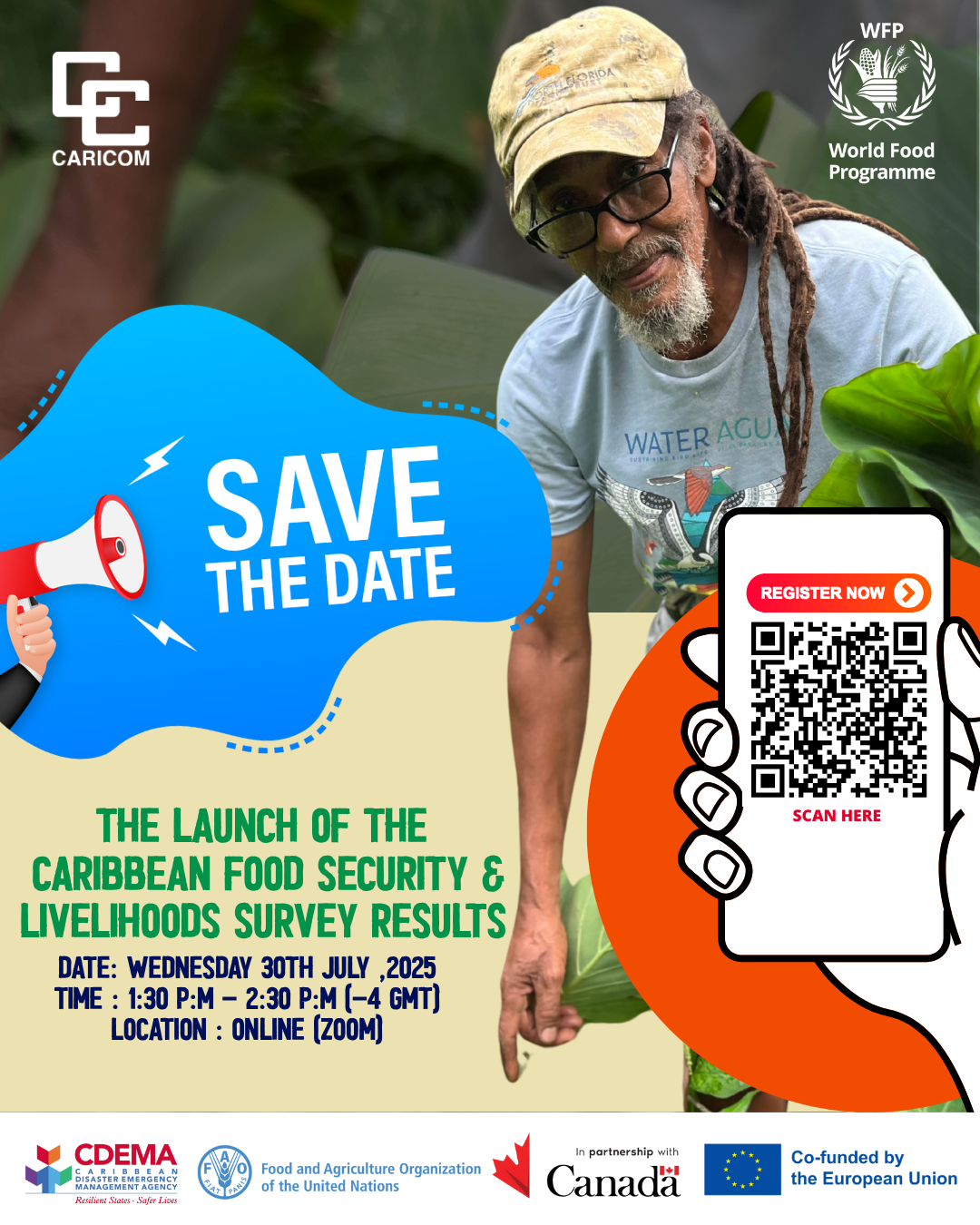
Being held under the theme “Sowing Change, Harvesting Resilience: Transforming Our Caribbean Food Systems for 2025 and Beyond,” CWA 2025 will be a vital platform for sowing the seeds of change. It will promote the exchange of innovations in climate-smart agriculture, the sharing of lessons learned, and the forging of purposeful partnerships across the Region.
The stage is set for the 19th staging of the Caribbean Week of Agriculture (CWA), which will take place from 29 September to 3 October in the twin-island Federation of St Kitts and Nevis.
A virtual launch of the Caribbean Community’s premier agricultural conference was held on Tuesday, 15 July. The event was anchored at the CARICOM Headquarters in Georgetown, Guyana, and included participation from key regional and international partners in agricultural development.
Being held under the theme “Sowing Change, Harvesting Resilience: Transforming Our Caribbean Food Systems for 2025 and Beyond,” CWA 2025 will be a vital platform for sowing the seeds of change. It will promote the exchange of innovations in climate-smart agriculture, the sharing of lessons learned, and the forging of purposeful partnerships across the Region.
In his feature address at the launch, Minister of Agriculture, Fisheries and Marine Resources of St Kitts and Nevis, the Honourable Samal Duggins, juxtaposed the challenges facing the region’s agriculture sector occasioned by extreme weather events, high shipping costs, and logistical hurdles with the resilience of farmers, officials, scientists, policymakers, and entrepreneurs.
“These challenges, however, illuminated our resilience. They have revealed the creativity and determination of our farmers, officials, scientists, policymakers, and entrepreneurs. They have underscored our capacity to adapt, our capacity to innovate, our capacity to build systems that are not merely reactive, but proactive and sustainable,” Minister Duggins said.
“Now is the time for us to sow seeds of transformation,” he added.
The Minister said CWA participants can look forward to engaging forums, technical workshops, dynamic exchanges, business-to-business networking, and insightful field visits that will showcase advancements in processing, sustainable farming, and the emerging green economy.
He reminded the participants that Caribbean Week of Agriculture is “a clarion call for us to reimagine how we produce, how we process, and how we protect our food. A call to mobilise investment, not only financial capital, but human talent and intellectual resources as well.”
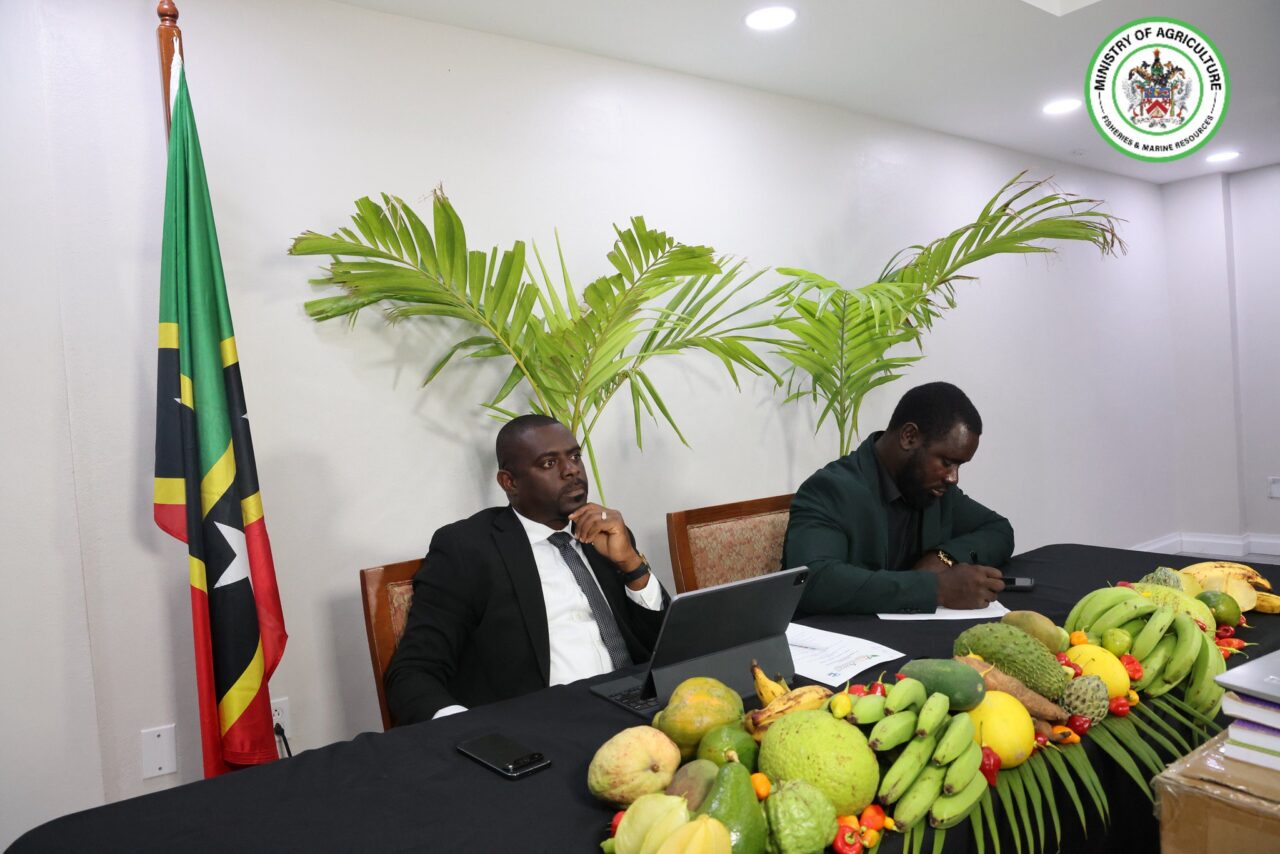
CWA is a united regional effort
Dr. Wendell Samuel, Senior Economic Adviser and Acting Assistant Secretary-General at the CARICOM Secretariat, said that CWA represents a united regional effort to address the pressing challenges of climate change and food and nutrition security. He noted that transforming Caribbean food systems and accelerating agricultural growth are central to this mission.
“The Caribbean Week of Agriculture continues to serve as the premier regional platform for raising awareness and promoting investments in agriculture and food and nutrition security,” Dr. Samuel stated.
“It plays a pivotal role in reshaping public perception, stimulating meaningful engagement, and supporting the growth of the region’s food systems,” he added.
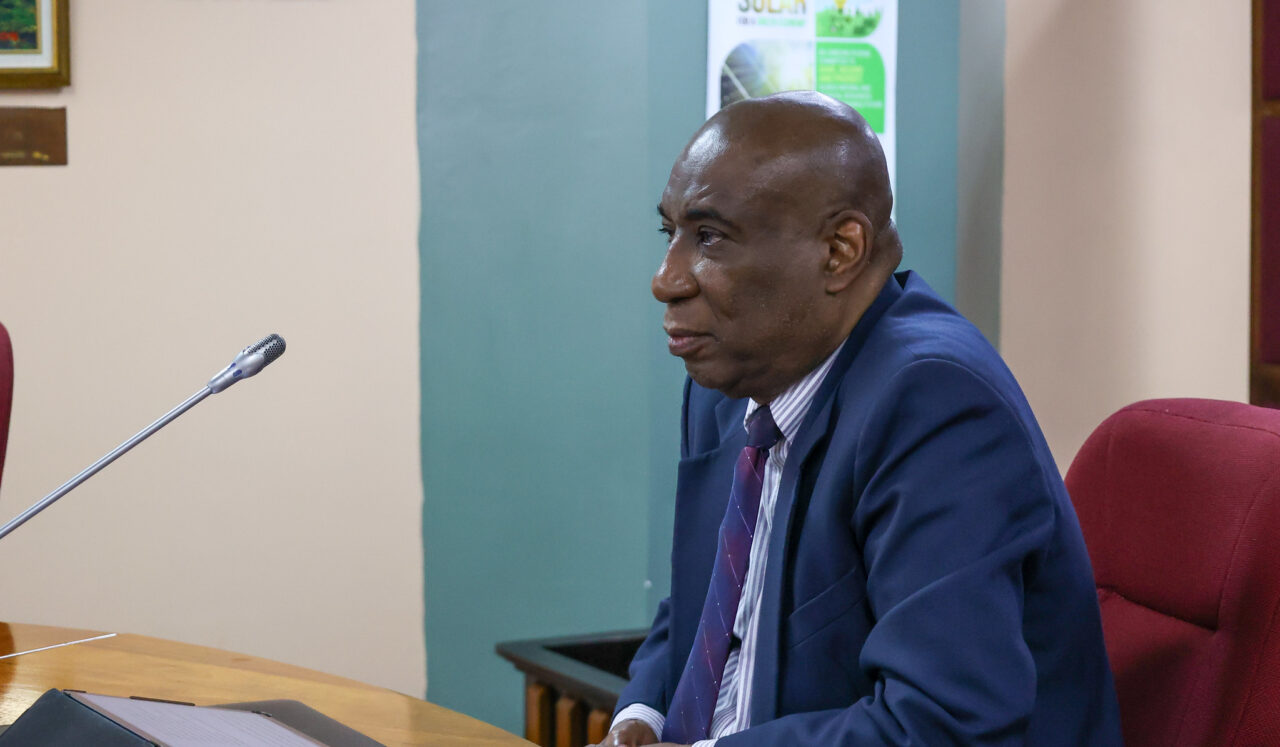
Ambassador David Prendergast, Director of Sectoral Programmes in the Directorate of Economic Integration, Innovation and Development (EIID), noted that the event will bring together a wide cross-section of stakeholders. These include agricultural planners, policymakers, farmers, producers, private sector actors, development partners, academic and research institutions, and regional organizations. Their collective participation, he said, underscores the region’s shared commitment to inclusive dialogue and transformational change in Caribbean agriculture.
The Director noted that 2025 marks a critical milestone in the Community’s journey toward securing a prosperous future for the sector. He said the CWA 2025 programme reflects that urgency, with a week-long series of activities beginning with a vibrant opening ceremony; an Open Expo, which will showcase innovative and sustainable agricultural practices; technical sessions and a Special Meeting of the Council for Trade and Economic Development on Agriculture.
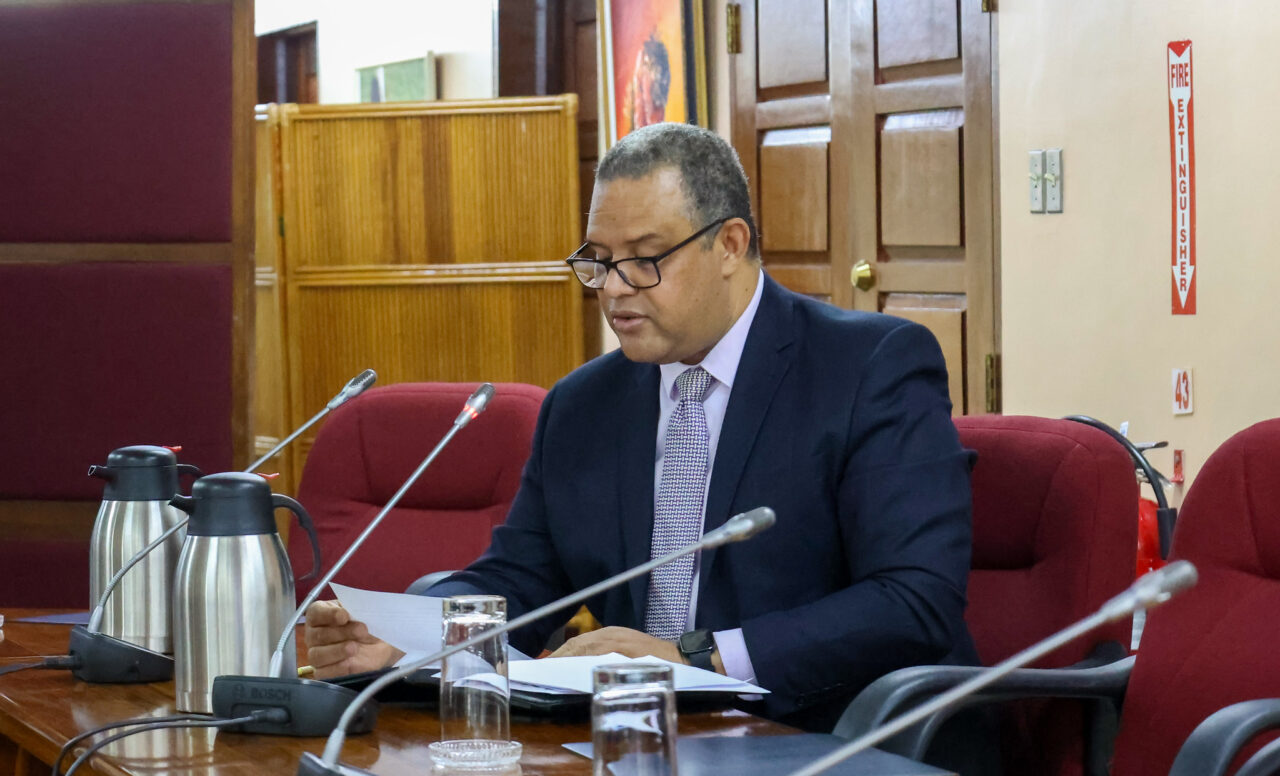
Youth issues, Caribbean Perspectives
Outlining the youth agenda at CWA 2025, the Chair of the CARICOM Youth Advisory Body, Ms Teesha Mangra said that the event will spotlight themes that matter most to her generation, including circular agriculture, the youth economy, digital market access, agri-innovation, inclusion of marginalized youth in food systems, agri-education, transitioning into entrepreneurship, and regional youth collaboration for climate and food resilience.
“These are not just youth issues, they are Caribbean imperatives. And we are not the future; we are present drivers of regional resilience,” she said, thanking partners who have supported youth involvement in agriculture, including CARICOM, the Inter-American Institute for Cooperation on Agriculture (IICA), the CARICOM Private Sector Organisation (CPSO), international partners, and regional governments.
“Thank you for investing in young people. Thank you for recognising that resilience does not grow in silos, but in solidarity,” Ms. Mangal stated.
International Partnerships and Cooperation
Director General of the Inter-American Institute for Cooperation on Agriculture (IICA), H.E. Dr. Manuel Otero, noted that this year’s theme for CWA is both timely and appropriate. He said it reflects the spirit of innovation and urgency needed to renew the Region’s commitment to securing a sustainable future for the agricultural sector, while also showcasing the very soul of the Caribbean, rooted in resilience.
He added that IICA remains committed to contributing to this important initiative, including strengthening extension services, boosting production and employment, and enhancing rural resilience. He also extended congratulations to Saint Kitts and Nevis for agreeing to host CWA 2025 and for its steadfast commitment to regional agricultural transformation.
Assistant Director-General and Regional Representative for Latin America and the Caribbean at the Food and Agriculture Organization of the United Nations (FAO), Mr. Máximo Torero, underscored FAO’s commitment to advancing regional agricultural priorities. He outlined the organisation’s work across the sector, including its support for the regional youth in agriculture agenda.
In this regard, he said FAO is mobilising financing and evidence-based policies to bring youth to the centre of agri-food systems.
FAO is also working with CARICOM on core governance issues in agriculture, including food security, trade, sanitary and phytosanitary standards, sustainable fisheries, and resource management, he stated.
Chief Executive Officer and Technical Director of the CARICOM Private Sector Organisation (CPSO), Dr. Patrick Antoine, said that the organisation “consistently endorsed the Region’s ’25 by 2025′ plan and remain firmly committed to working with the Community to help ensure that the extended initiative to 2030 is fully realized.”
Dr. Antoine added that the CPSO also fully supports the implementation of the CARICOM Single Market and Economy (CSME) and remains focused on accelerating regional integration through private sector-led growth.
“We are committed to creating the enabling environment for investment, reducing barriers to trade, and unlocking the full potential of the region’s productive sectors, especially our food and agricultural sectors,” he said.
Please view highlights from the launch here.
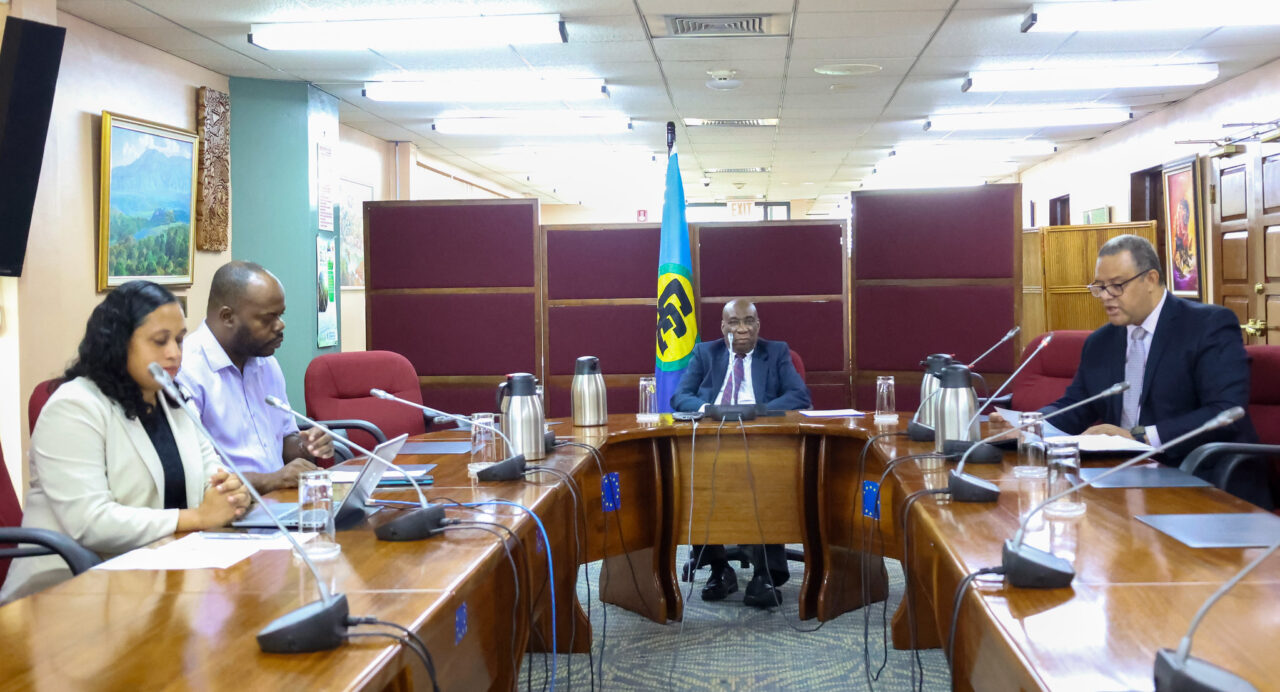
The launch will feature a keynote address by the Hon. Samal Duggins, Minister of Agriculture, Fisheries and Marine Resources of St. Kitts and Nevis; remarks by Dr. Wendell Samuel, CARICOM Assistant Secretary-General (ag), Economic Integration, Innovation and Development,; Ms. Teesha Mangra, Chair of the CARICOM Youth Advisory Body, and representatives from regional and international organisations which are partnering to hold the CWA.
Representatives of the media are invited to provide coverage of the following:
EVENT: Launch, Caribbean Week of Agriculture 2025
WHEN: 15 July 2025| 10 am AST
The launch will be streamed live via the following CARICOM social media platforms: Facebook, YouTube, and X.
ABOUT THE CARIBBEAN WEEK OF AGRICULTURE
The Caribbean Week of Agriculture (CWA) is the premier event on the regional agricultural calendar. It is a roving event hosted by CARICOM Member States and Associate Members and includes seminars, key meetings, a special meeting of the Council for Trade and Economic Development (COTED), and an exhibition.
The CWA was conceptualised by the Inter-American Institute for Cooperation on Agriculture (IICA) as a facility to place agriculture and rural life on the front burner of regional integration activities and in doing so enable:
- the key decision-makers in the public and private sectors to better acknowledge the importance of agriculture and rural life to the economic, social, and environmental stability of the region; and
- for the major stakeholders in agriculture and related sectors to have an opportunity to dialogue and forge a common vision for the repositioning of agriculture and the enhancement of rural life.
The CWA is convened under the aegis of the Alliance for Sustainable Development of Agriculture and the Rural Milieu (The Alliance). From the inaugural meeting in 1998, the two main collaborating agencies were IICA and the Caribbean Community (CARICOM) Secretariat.
In 2002, the Food and Agriculture Organization (FAO) and the Caribbean Agricultural Research and Development Institute (CARDI) joined IICA and CARICOM to establish a core group which functions as the Secretariat of The Alliance. Since then, the four agencies have collaborated on the management and logistics necessary for the convening and servicing of meetings of The Alliance as well as the myriad of activities during the CWA. The Technical Centre for Agricultural and Rural Cooperation (CTA) which was a joint international institution of the African, Caribbean and Pacific (ACP) Group of States and the European Union (EU) from 1983 – 2020, was a major partner and sponsor of the CWA activities from 2003.
To date, there have been 18 successful editions of the CWA. The first CWA was held in Trinidad and Tobago in 1999. Last year, St. Vincent and the Grenadines hosted the event. Close to 500 visitors joined Vincentians for the week of activities that focused on ‘Climate-Smart Agriculture for a Sustainable Future’.
Click here to listen as Ms. Deborah Daniel, Agriculture Planning Officer, St. Vincent and the Grenadines, reflects on the 2024 edition of the Caribbean Week of Agriculture and shares advice for hosting the event.
]]>The MoU signing was hosted at the Ministry of Agriculture’s main boardroom. It is a pivotal milestone in Guyana’s food security agenda, championed by President Dr Mohamed Irfaan Ali.
The agreement lays the foundation for integrating modern marketing strategies and branding mechanisms to expand Guyana’s agricultural exports, reduce post-harvest losses, and secure a stronger presence in the CARICOM and South American markets.
During the ceremony, Minister of Agriculture Zulfikar Mustapha emphasised the transformational progress Guyana has made since 2020. He said Guyana is the only country in the world that can feed its citizens.
Please see the press release from the Department of Public Information here.
]]>“It’s an interesting journey for us. It’s a transformative journey that we have undertaken as a Region, and I’m happy to report that there have been positives; there have been some highlights that we are, in fact, proud of as a Region. And it says to us, we are progressing in a direction that once we’re able to keep the momentum and to keep our eyes on the ball, we should be able to achieve a majority of what it is that we want for regional food security,” Mr. Shaun Baugh, Agricultural and Agro-Industrial Programme Manager at the CARICOM Secretariat said in an interview with the Communications Unit.
Speaking ahead of the Forty-ninth Meeting of the Conference of Heads of Government of CARICOM, set for 6-8 July 2025 in Montego Bay, Jamaica, Mr. Baugh shared a comprehensive update on the progress of the food security initiative that is aimed at reducing the Region’s food import bill.
The Heads of Government at their last meeting in February, extended the timeline of the initiative – renamed ’25 x 25+5′ – from 2025 to 2030 to build on its early successes.
CARICOM Secretary-General accepted the Letter of Credence from the new Ambassador of Japan to CARICOM, His Excellency Dr. UMEZAWA Akima noting that the CARICOM Secretariat headquarters, funded by Japan, stands as a testament to the enduring strength of CARICOM-Japan relations.
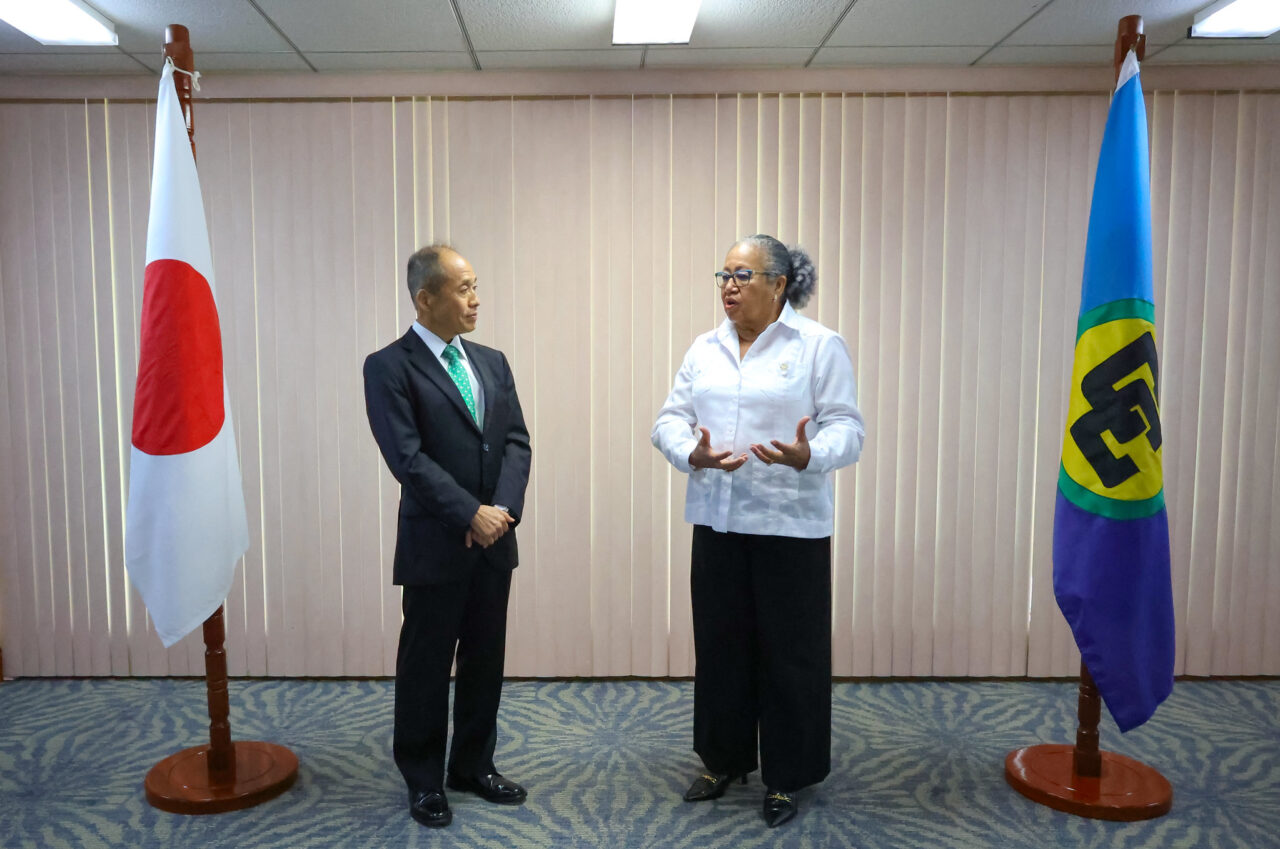
“Since establishing formal diplomatic ties in 1993, Japan has been a vital partner to the Community,” the Secretary-General noted, as she expressed optimism for continued strong relations during Ambassador Akima’s tenure.
The new Japanese envoy conveyed greetings from His Majesty Emperor Naruhito, who extended Japan’s best wishes and interest in maintaining and further promoting robust relations with CARICOM.
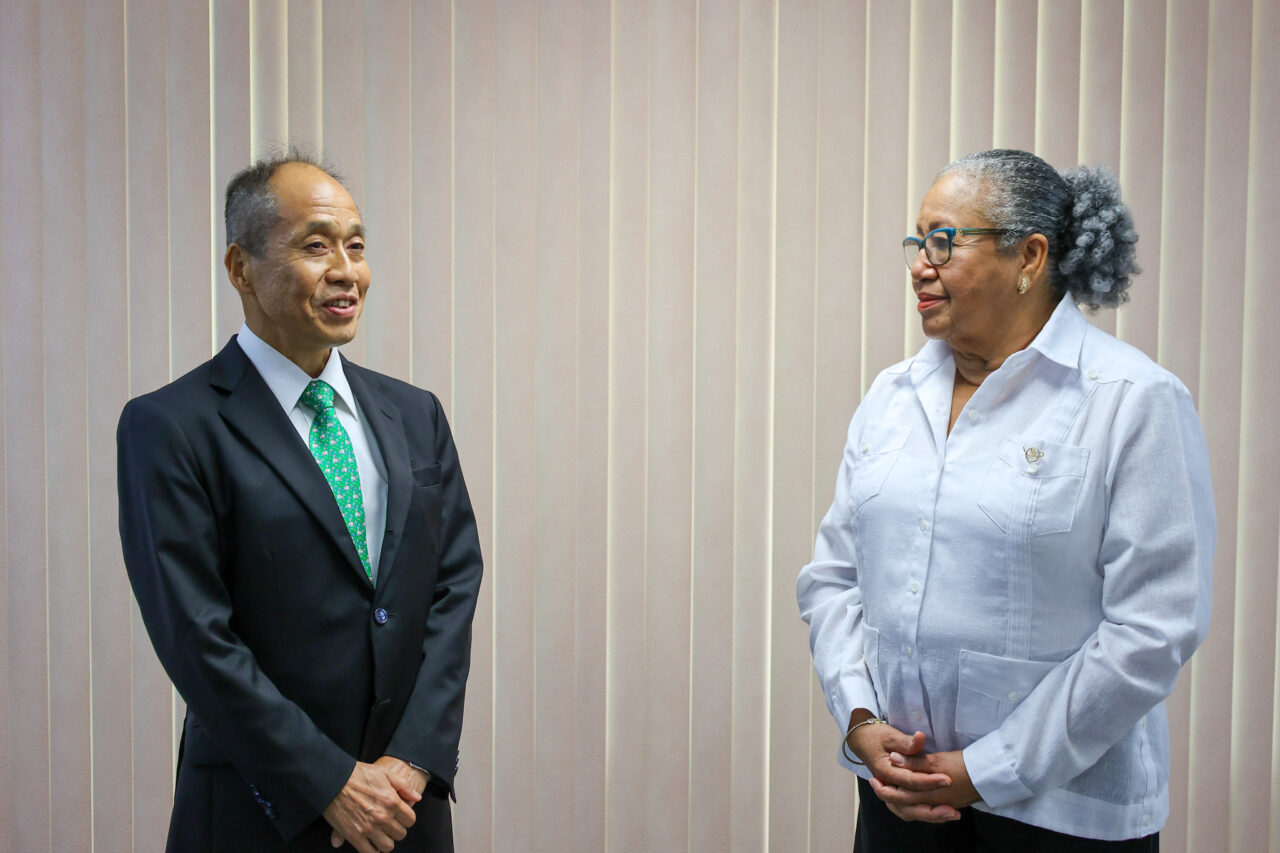
Ambassador Akima said that Japan’s commitment to CARICOM is demonstrated through support for green initiatives such as the photovoltaic power generation and building energy management system it funded at the CARICOM Secretariat, high-level engagements at the Heads of Government and Ministerial levels, as well as people-to-people connection. He pledged to continue fostering this strong relationship during his tenure.
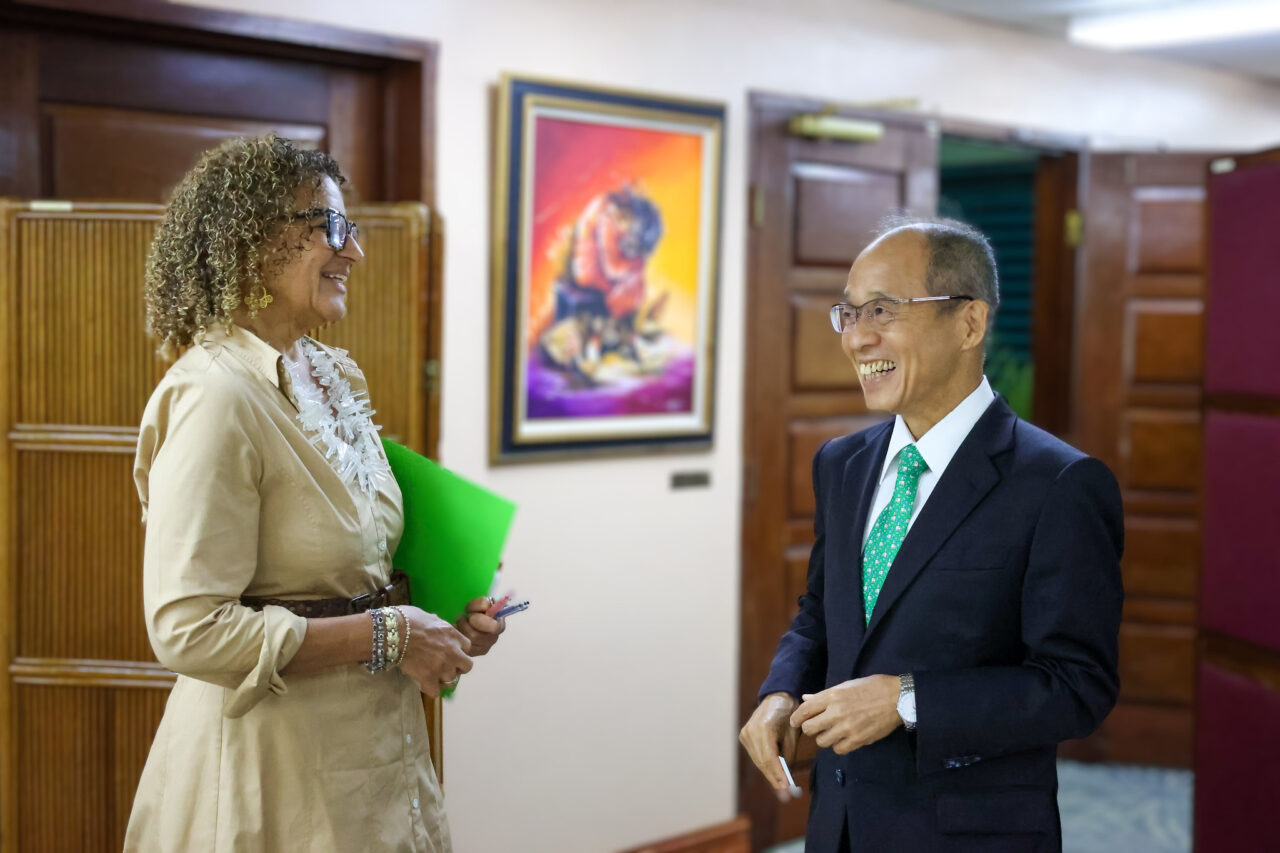
As she accredited the new Ambassador of Colombia to CARICOM, His Excellency Graybern Livingston Forbes, Dr. Barnett underscored the deep commitment CARICOM and Colombia place in their long-standing relationship.
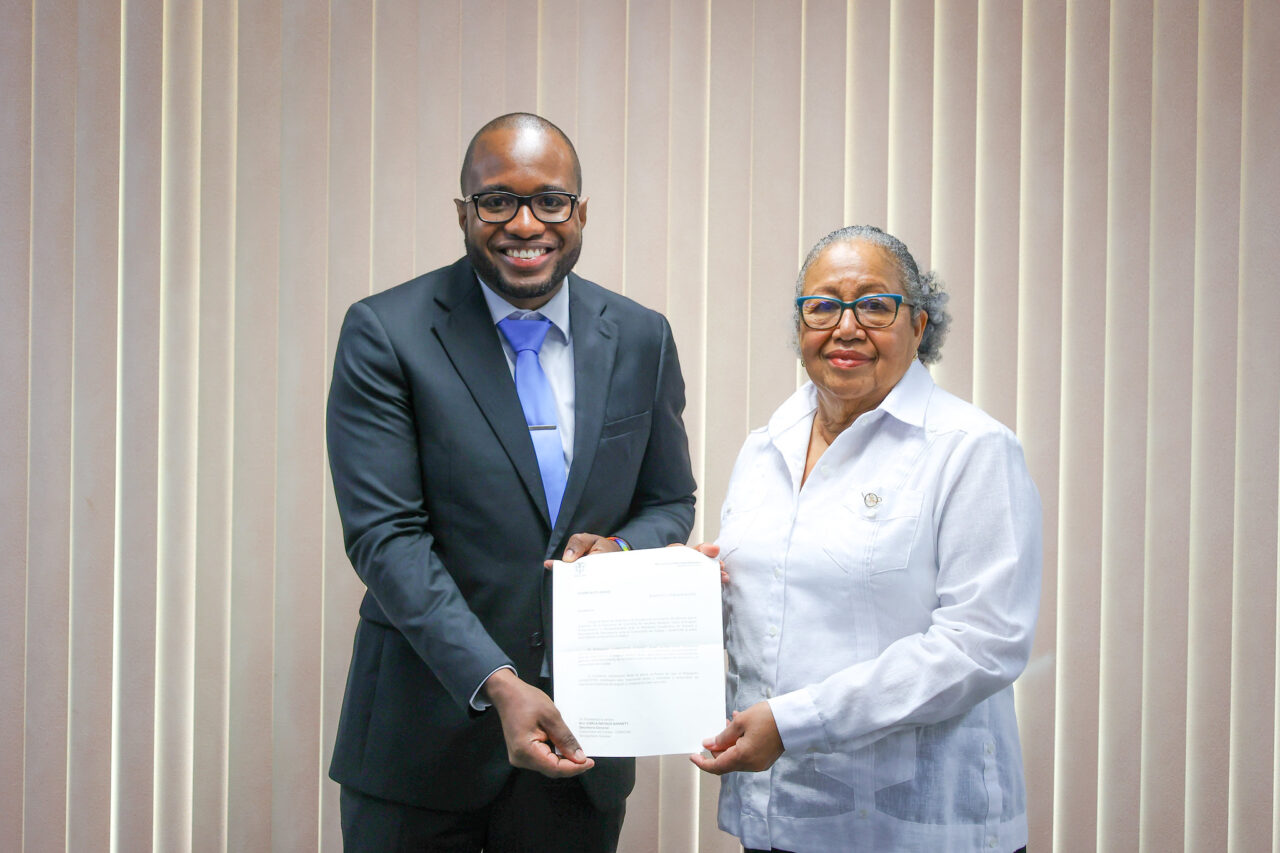
“This is particularly important in these times of global uncertainty, which demand even greater collaboration between nations with mutual interests and developmental aspirations,” she stated.
The Secretary-General expressed appreciation for Colombia’s support on critical issues for Small Island and Low-lying Coastal Developing States (SIDS), such as climate change. She emphasised the importance of stronger global efforts to cap temperature rise at 1.5°C and noted Colombia’s role in amplifying this call.
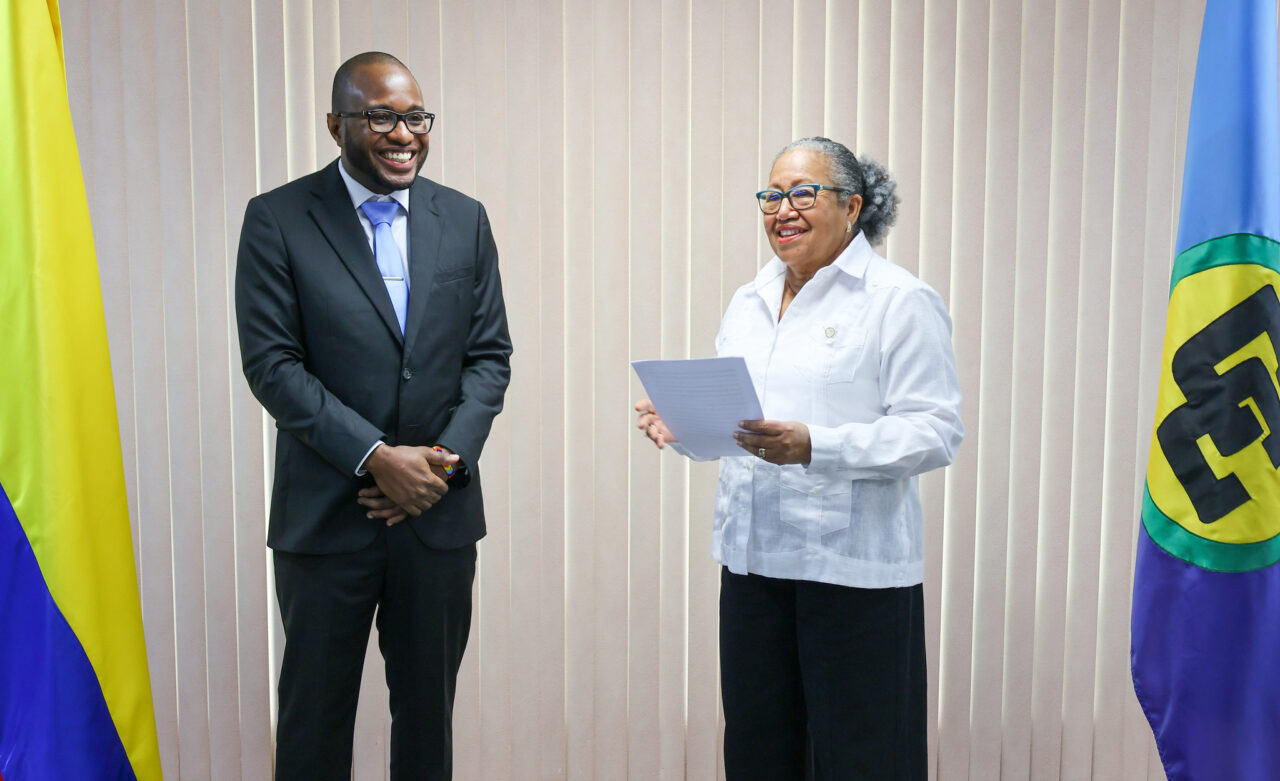
Highlighting the success of collaboration between CARICOM and Colombia, Dr. Barnett pointed out the Barranquilla Declaration (2022), which outlines joint priorities in trade, tourism, security, agriculture, human development, culture, and sports.
“We remain interested in furthering these priorities through the CARICOM-Colombia Joint Commission on Technical Cooperation, as well as the other areas identified in the First and Second Cooperation Programmes, with emphasis on the environment, education, sustainable agriculture, disaster resilience, and security.”
Noting the progress CARICOM and Colombia are making in the negotiations for enhanced market access under the 1994 Trade, Economic, and Technical Cooperation Agreement, she expressed optimism that those negotiations will conclude this year, to open up new avenues for trade.
Mr. Forbes recalled the recent Third CARICOM-Colombia Ministerial Summit in Cartagena, noting that it marked a significant step in strengthening collaboration and resulted in key agreements on sustainable development and climate change mitigation.
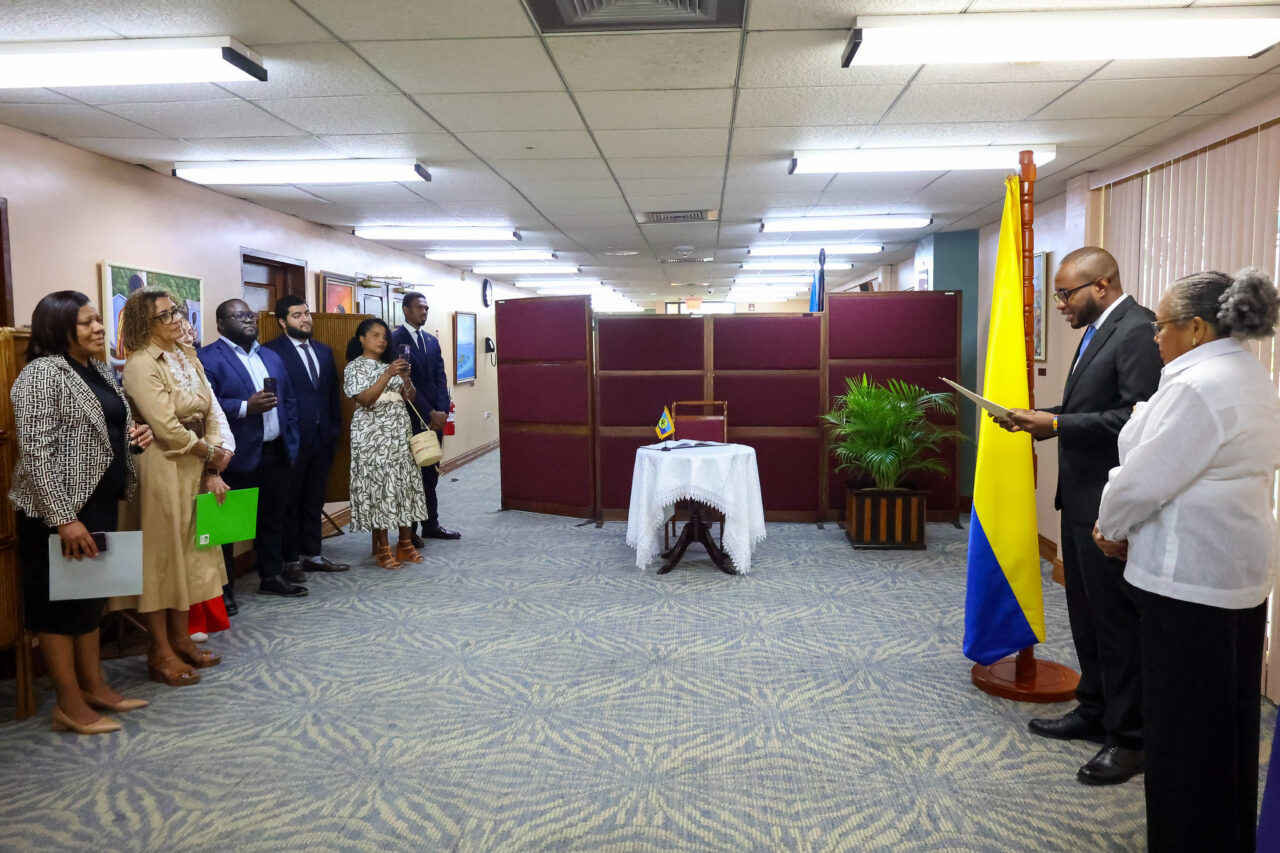
The reopening of the Colombian Embassy in Guyana, as well as those in Barbados, Jamaica, and Trinidad and Tobago, he said, symbolises the country’s deep and growing commitment to the region.
“This presence becomes even more meaningful at a time when solidarity and friendship are essential to addressing global challenges—especially those that affect the Global South,” Mr. Forbes said.
The Ambassador, who hails from the Colombian archipelago of San Andrés, Providencia, and Santa Catalina, reflected on the rich historical, cultural, and geographical connections San Andrés shares with the Caribbean islands.
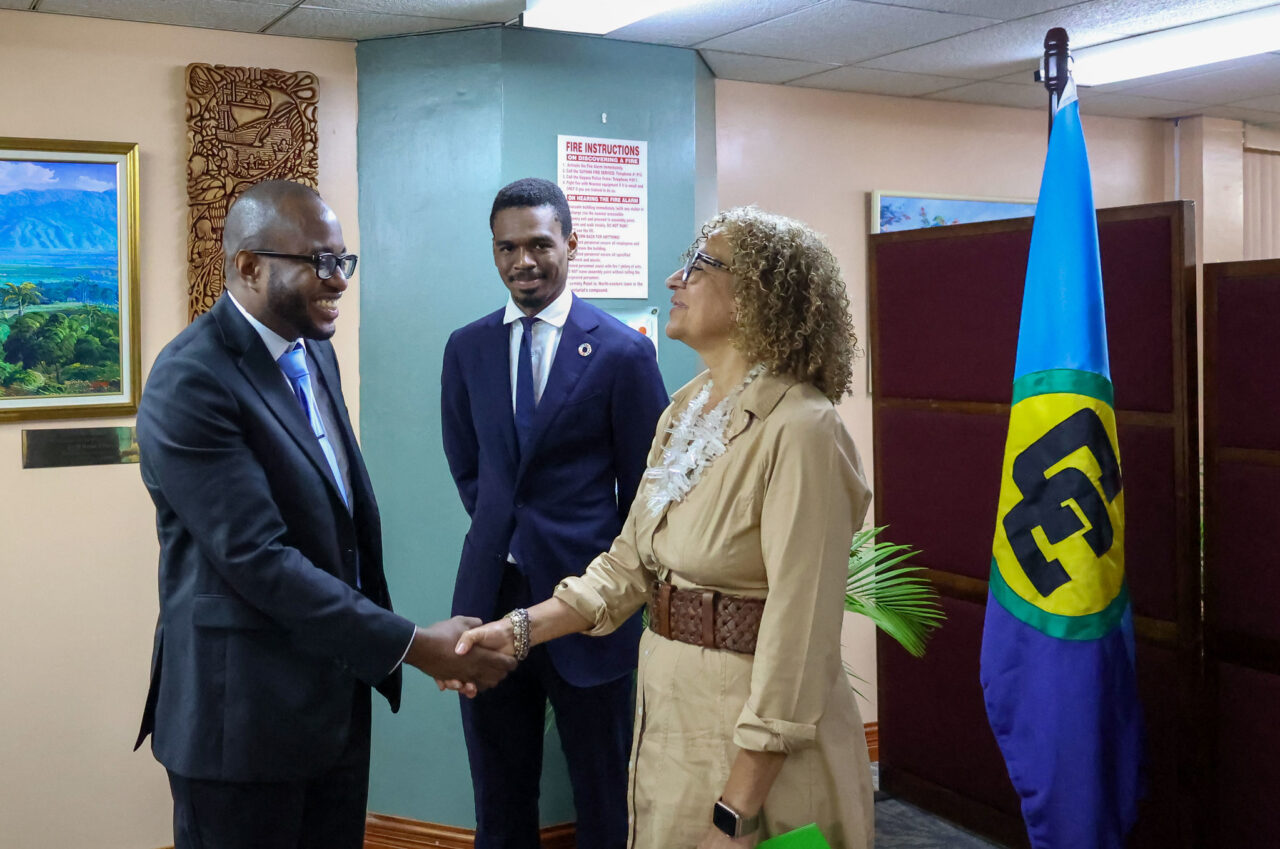
He recounted his first visit to Guyana, where he felt a profound sense of familiarity and recalled Cuban philosopher Antonio Benítez-Rojo’s book, The Repeating Island, which describes the Caribbean as a space where, despite its fragmentation and diversity, patterns emerge and repeat across geography and time.
“This idea resonated deeply with me. Yet it was only after visiting Guyana that I truly understood its meaning. I felt at home in every corner of Guyana—the people, the neighbourhoods, the music. Everything felt familiar,” Ambassador Forbes explained.
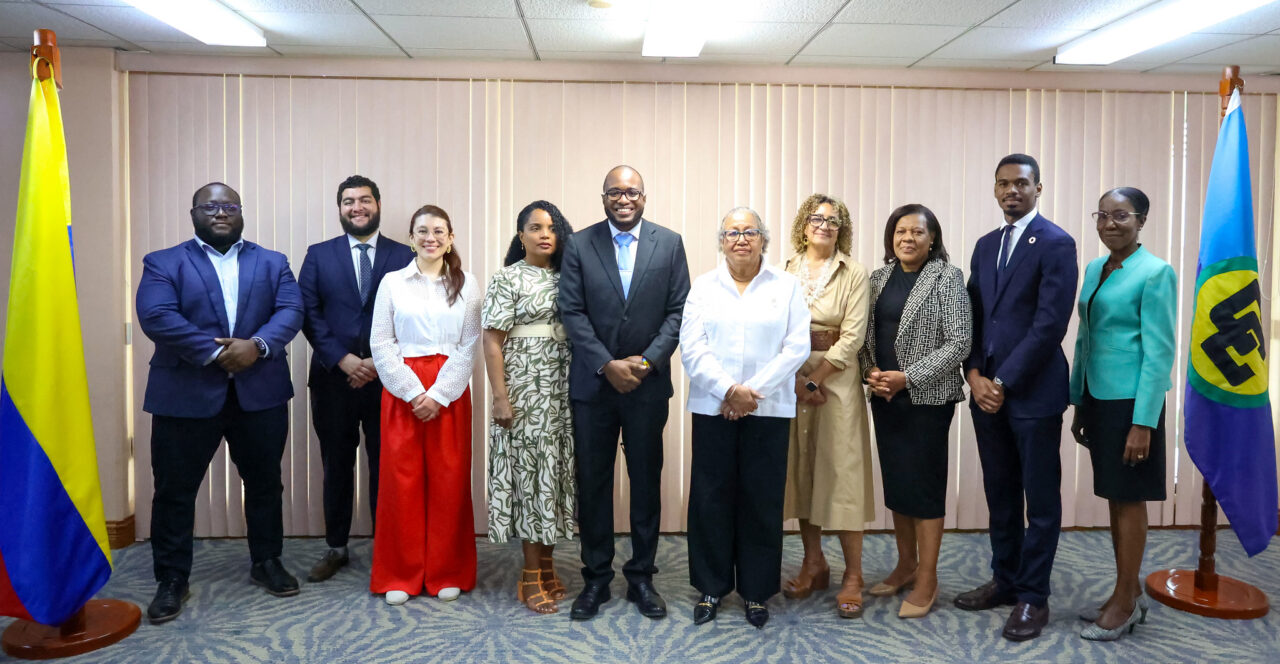
Senior Minister in the Office of the President with Responsibility for Finance and the Public Service, Dr. Ashni Singh, who signed on behalf of Government, while thanking the CDF for its support over the years noted that Guyana is proud to be a founding member of the CDF and to have benefited from the Fund’s activities over the years.
“As a Government, led by His Excellency President Irfaan Ali, we recognise the importance of a strong and competitive non-oil economy, and I want to assure you that we consider agriculture and agricultural products to be a principal pillar of our non-oil economy, and we anticipate that long into the future, agriculture will remain an important source of economic growth and an important contributor to livelihoods, in particular rural and hinterland livelihoods, “ Dr. Singh explained to CDF’s CEO.
He added that Guyana will long maintain and further enhance its position in relation to the achievement of food security for the Caribbean region more broadly, noting that this project and others like it, have a very important role to play in ensuring the country realises this achievement.
Dr. Singh also outlined various agricultural projects supported by the CDF over the years, including farm-to market roads, highlighting that this project, which will be implemented by the Ministry of Agriculture under the leadership of Minister of Agriculture Zulfikar Mustapha, also aligns closely with Guyana’s and the CARICOM Region’s food security agenda.
“This project is in a sector that is extremely important and it aligns closely with our national development priorities, and with the regional agenda on food security,” he concluded.
Speaking at the signing ceremony, Chief Executive Officer (CEO) of the CDF Mr. Rodinald Soomer said the US$18 million programme is a bold and strategic investment in the fulfilment of CARICOM and Guyana’s shared vision for a resilient, productive and inclusive agricultural sector that not only feeds the nation but nourishes the Region and reinforces Guyana’s leadership role in advancing food and nutrition security in CARICOM.
“This programme is intended to enrich lives, uplift local communities and regions, and create new economic opportunities for producers and processors of coconuts, cocoa, coffee, peanuts, pigs and pork products, honey and associated by-products and vegetables,” he explained.
The CEO added that under the AIDP, the foundation for a safer, more competitive agricultural sector will be laid, with the construction of a modern swine abattoir, 13 new or upgraded agro-processing facilities, and eight enhanced surveillance outposts to enable officers to execute their duties under conditions which are more conducive and should yield better results in combating the prevalence of the carambola fruit fly.
With President Irfaan Ali being CARICOM’s lead representative for agriculture in the region, the project’s proposed activities have notably satisfied several aspects of CARICOM’s goal of reducing the Region’s food import bill, as well as in the areas of food and nutrition security, implementation and operationalisation of sanitary and phytosanitary- related policies, and increased production and climate smart agriculture.
The programme will contribute to the Government’s broader diversification strategy including through the further development in agriculture, one of the country’s main non-oil sectors. With most agriculture concentrated on the coast facing challenges such as climate change risks and reduced availability of water and suitable land, Guyana’s Ministry of Agriculture aims to increase production and value addition in selected commodities. Through projects such as this, the Ministry will be in a stronger position to propose policies and investments that generate the highest return for the country, in line with Guyana’s National Strategy for Agriculture (2020–2030). (Guyana Ministry of Finance Press Release)
]]>The mission was headed by Ms. Alexis Downes-Amsterdam, Director General of CARIFORUM, and was undertaken in collaboration with the Ministry of Foreign Affairs and Foreign Trade Barbados. The CARIFORUM team also included representatives from the EU EPA and UK EPA Programmes.
During the visit, the team engaged a cross-section of national stakeholders including representatives of key government agencies such as the Ministry of Foreign Affairs and Foreign Trade, Ministry of Agriculture, Customs and Excise Department and business support organisations.
Discussions focused on the administrative and legal measures required for Barbados to fully implement the agreements and implementation challenges. The CARIFORUM team provided technical guidance on advancing the required measures and addressing the challenges.

The CARIFORUM Directorate’s targeted support was also intended to ensure that Barbados is not only compliant with its EPA obligations but also equipped to translate market access into market presence and tangible long-term economic opportunities. Support to CARIFORUM States includes technical assistance to advance priority measures, targeted capacity building to boost export readiness and institutional strengthening to help CARIFORUM States maximise the opportunities available under the Agreements.
Signed in 2008, the Economic Partnership Agreement between the CARIFORUM countries and the European Union is a fundamental cornerstone in this relationship to boost trade and investment between the two regions.
The CARIFORUM-UK EPA was signed in 2021 with the aim of maintaining the trading relationship between CARIFORUM States and the United Kingdom post-BREXIT.
]]>